11 start with O start with O
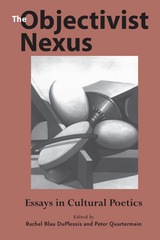
"Objectivist" writers, conjoined through a variety of personal, ideological, and literary-historical links, have, from the late 1920s to the present, attracted emulation and suspicion. Representing a nonsymbolist, postimagist poetics and characterized by a historical, realist, antimythological worldview, Objectivists have retained their outsider status. Despite such status, however, the formal, intellectual, ideological, and ethical concerns of the Objectivist nexus have increasingly influenced poetry and poetics in the United States.
Thus, argue editors Rachel Blau DuPlessis and Peter Quartermain, the time has come for an anthology that unites essential works on Objectivist practices and presents Objectivist writing as an enlargement of the possibilities of poetry rather than as a determinable and definable literary movement. The authors' collective aim is to bring attention to this group of poets and to exemplify and specify cultural readings for poetic texts--readings alert to the material world, politics, society, and history, and readings concerned with the production, dissemination, and reception of poetic texts.
The contributors consider Basil Bunting, Lorine Niedecker, George Oppen, Carl Rakosi, Charles Reznikoff, and Louis Zukofsky within both their historical milieu and our own. The essays insist on poetry as a mode of thought; analyze and evaluate Objectivist politics; focus on the ethical, spiritual, and religious issues raised by certain Objectivist affiliations with Judaism; and explore the dissemination of poetic texts and the vagaries of Objectivist reception. Running throughout the book are two related threads: Objectivist writing as generally a practice aware of its own historical and social contingency and Objectivist writing as a site of complexity, contestation, interrogation, and disagreement.

What offers over seven hundred witty enigmas in several languages? Answer: The Old English and Anglo-Latin Riddle Tradition. Riddles, wordplay, and inscrutable utterances have been at the heart of Western literature for many centuries. Often brief and always delightful, medieval riddles provide insights into the extraordinary and the everyday, connecting the learned and the ribald, the lay and the devout, and the familiar and the imported. Many solutions involve domestic life, including “butter churn” and “chickens.” Others like “the harrowing of hell” or “the Pleiades” appeal to an educated elite. Still others, like “the one-eyed seller of garlic,” are too absurd to solve: that is part of the game. Riddles are not simply lighthearted amusement. They invite philosophical questions about language and knowledge.
Most riddles in this volume are translated from Old English and Latin, but it also includes some from Old Norse–Icelandic. The Old English and Anglo-Latin Riddle Tradition assembles, for the first time ever, an astonishing array of riddles composed before 1200 CE that continue to entertain and puzzle.

Religious piety has rarely been animated as vigorously as in Old English Poems of Christ and His Saints. Ranging from lyrical to dramatic to narrative, the individual poems show great inventiveness in reimagining perennial Christian topics. In different poems, for example, Christ expels Lucifer from heaven, resists the devil's temptation on earth, mounts the cross with zeal to face death, harrows hell at the urging of John the Baptist, appears in disguise to pilot a ship, and presides over the Last Judgment. Satan and the fallen angels lament their plight in a vividly imagined hell and plot against Christ and his saints.
In Andreas the poet relates, in language reminiscent of Beowulf, the tribulations of the apostles Andrew and Matthew in a city of cannibals. In The Vision of the Cross (also known as The Dream of the Rood), the cross speaks as a Germanic warrior intolerably torn between the imperative to protect his Lord and the duty to become his means of execution. In Guthlac A, an Anglo-Saxon warrior abandons his life of violence to do battle as a hermit against demons in the fens of Lincolnshire. As a collection these ten anonymous poems vividly demonstrate the extraordinary hybrid that emerges when traditional Germanic verse adapts itself to Christian themes.
Old English Poems of Christ and His Saints complements the saints' lives found in The Old English Poems of Cynewulf, DOML 23.

The twenty-five poems and eleven metrical charms in this Old English volume offer tantalizing insights into the mental landscape of the Anglo-Saxons. The Wanderer and The Seafarer famously combine philosophical consolation with introspection to achieve a spiritual understanding of life as a journey. The Wife’s Lament, The Husband’s Message, and Wulf and Eadwacer direct a subjective lyrical intensity on the perennial themes of love, separation, and the passion for vengeance. From suffering comes wisdom, and these poems find meaning in the loss of fortune and reputation, exile, and alienation. “Woe is wondrously clinging; clouds glide,” reads a stoic, matter-of-fact observation in Maxims II on nature’s indifference to human suffering. Another form of wisdom emerges in the form of folk remedies, such as charms to treat stabbing pain, cysts, childbirth, and nightmares of witch-riding caused by a dwarf. The enigmatic dialogues of Solomon and Saturn combine scholarly erudition and proverbial wisdom. Learning of all kinds is celebrated, including the meaning of individual runes in The Rune Poem and the catalog of legendary heroes in Widsith.
This book is a welcome complement to the previously published DOML volume Old English Shorter Poems, Volume I: Religious and Didactic.

Alongside famous long works such as Beowulf, Old English poetry offers a large number of shorter compositions, many of them on explicitly Christian themes. This volume of the Dumbarton Oaks Medieval Library presents twenty-nine of these shorter religious poems composed in Old and early Middle English between the seventh and twelfth centuries. Among the texts, which demonstrate the remarkable versatility of early English verse, are colorful allegories of the natural world, poems dedicated to Christian prayer and morality, and powerful meditations on death, judgment, heaven, and hell.
Previously edited in many different places and in some instances lacking accessible translations, many of these poems have remained little known outside scholarly circles. The present volume aims to offer this important body of texts to a wider audience by bringing them together in one collection and providing all of them with up-to-date translations and explanatory notes. An introduction sets the poems in their literary-historical contexts, which are further illustrated by two appendices, including the first complete modern English translation of the so-called Old English Benedictine Office.
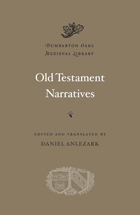
The Old English poems in this volume are among the first retellings of scriptural texts in a European vernacular. More than simple translations, they recast the familiar plots in daringly imaginative ways, from Satan's seductive pride (anticipating Milton), to a sympathetic yet tragic Eve, to Moses as a headstrong Germanic warrior-king, to the lyrical nature poetry in Azarias.
Whether or not the legendary Caedmon authored any of the poems in this volume, they represent traditional verse in all its vigor. Three of them survive as sequential epics in a manuscript in the Bodleian Library at Oxford. The first, the Old English Genesis, recounts biblical history from creation and the apocryphal fall of the angels to the sacrifice of Isaac; Abraham emerges as the central figure struggling through exile toward a lasting covenant with God. The second, Exodus, follows Moses as he leads the Hebrew people out of Egyptian slavery and across the Red Sea. Both Abraham and Moses are transformed into martial heroes in the Anglo-Saxon mold. The last in the triad, Daniel, tells of the trials of the Jewish people in Babylonian exile up through Belshazzar's feast. Azarias, the final poem in this volume (found in an Exeter Cathedral manuscript), relates the apocryphal episode of the three youths in Nebuchadnezzar's furnace.
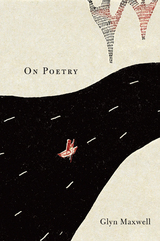
“This is a book for anyone,” Glyn Maxwell declares of On Poetry. A guide to the writing of poetry and a defense of the art, it will be especially prized by writers and readers who wish to understand why and how poetic technique matters. When Maxwell states, “With rhyme what matters is the distance between rhymes” or “the line-break is punctuation,” he compresses into simple, memorable phrases a great deal of practical wisdom.
In seven chapters whose weird, gnomic titles announce the singularity of the book—“White,” “Black,” “Form,” “Pulse,” “Chime,” “Space,” and “Time”—the poet explores his belief that the greatest verse arises from a harmony of mind and body, and that poetic forms originate in human necessities: breath, heartbeat, footstep, posture. “The sound of form in poetry descended from song, molded by breath, is the sound of that creature yearning to leave a mark. The meter says tick-tock. The rhyme says remember. The whiteness says alone,” Maxwell writes. To illustrate his argument, he draws upon personal touchstones such as Emily Dickinson and Robert Frost. An experienced teacher, Maxwell also takes us inside the world of the creative writing class, where we learn from the experiences of four aspiring poets.
“You master form you master time,” Maxwell says. In this guide to the most ancient and sublime of the realms of literature, Maxwell shares his mastery with us.
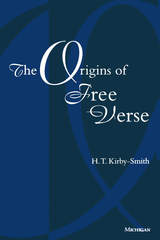
Though free verse became a dominant poetic mode only in the twentieth century, Kirby-Smith finds its roots in seventeenth-century England. Beginning his study with writers such as John Milton--who was considered by T. S. Eliot to be the greatest writer of free verse in English--the author places recent and divisive topics in poetics in context, showing them to be attenuated remnants of issues first broached hundreds of years ago.
The book seeks to establish a consensus on the nature of free verse, with reference to critics and poets including Pound, Eliot, Williams, Amy Lowell, Yvor Winters, and Hugh Kenner. Good free verse, argues Kirby-Smith, arises as a reaction to a well-established set of conventions. Likewise, The Origins of Free Verse goes against the conventions of existing poetic scholarship, offering an encompassing yet fresh--and controversial--literary history of free verse.
"At moments, this study is revelatory. . . . In its range and detail it offers a way of thinking about the history of English-language prosody which recognizes the importance of the poet's individual choices and undercuts our century's vanity. . . . Poetry is a learned art, and Kirby-Smith brings both insight and much learning to reading it." --Times Literary Supplement
"The best study of free verse I have seen. . . . The Origins of Free Verse is a book that all students of prosody will want to read. " --Harvard Review
". . . a witty and polemical account of the emergence and development of free verse." --Choice
H. T. Kirby-Smith is Professor of English, University of North Carolina at Greensboro.
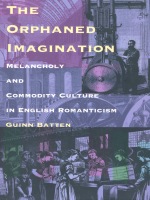
Building on the theoretical insights of Slavoj Zizek, Judith Butler, Julia Kristeva, and Eve Kosofsky Sedgwick, Batten interweaves the discourses of psychoanalysis, economics, biography, sexuality, melancholy, value, and exchange to question accepted ideas of how Romantic poetry works. She asserts that poetic labor is in fact paradigmatic of the kinds of production—and the kinds of desire—that capitalist culture renders invisible. If symbolic exchange, in cash or in words, requires the surrender of a beloved object, if healthy mourning requires an orphan to “work through” emotional loss through the consolation of art or a love for the living, then the rebellious Romantic poet, Batten contends, possessed unique insight into the alternative authority of a poetic language that renounced a culture of denial. Batten urges that scholars move beyond critical approaches condemning allegedly regressive forms of pleasure, recognizing that they, too, are haunted by melancholic attachments to dead poets as they conduct their work.
The Orphaned Imagination will interest anyone concerned with the claims of the English Romantic poets to a distinctive, valuable form of knowledge and those who may wonder about the power of contemporary theory to illuminate a traditional field.
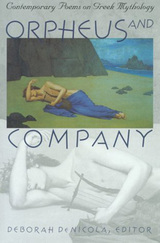
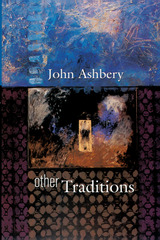
One of the greatest living poets in English here explores the work of six writers he often finds himself reading "in order to get started" when writing, poets he turns to as "a poetic jump-start for times when the batteries have run down." Among those whom John Ashbery reads at such times are John Clare, Thomas Lovell Beddoes, Raymond Roussel, John Wheelwright, Laura Riding, and David Schubert. Less familiar than some, under Ashbery's scrutiny these poets emerge as the powerful but private and somewhat wild voices whose eccentricity has kept them from the mainstream--and whose vision merits Ashbery's efforts, and our own, to read them well.
Deeply interesting in themselves, Ashbery's reflections on these poets of "another tradition" are equally intriguing for what they tell us about Ashbery's own way of reading, writing, and thinking. With its indirect clues to his work and its generous and infectious appreciation of a remarkable group of poets, this book conveys the passion, delight, curiosity, and insight that underlie the art and craft of poetry for writer and reader alike. Even as it invites us to discover the work of poets in Ashbery's other tradition, it reminds us of Ashbery's essential place in our own.
READERS
Browse our collection.
PUBLISHERS
See BiblioVault's publisher services.
STUDENT SERVICES
Files for college accessibility offices.
UChicago Accessibility Resources
home | accessibility | search | about | contact us
BiblioVault ® 2001 - 2024
The University of Chicago Press









